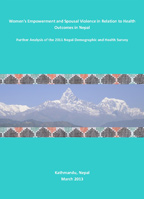- PUBLICATIONS
- JOURNAL ARTICLES
- ACCESS PUBLICATIONS
Publications Summary
- Document Type
- Further Analysis
- Publication Topic(s)
- Domestic Violence, Gender
- Country(s)
- Nepal
- Survey
- Nepal DHS, 2011
- Language
- English
- Recommended Citation
- Tuladhar, Sabita, Kabi Raj Khanal, Lila K.C., Paban Kumar Ghimire, and Karuna Onta. 2013. Women's Empowerment and Spousal Violence in Relation to Health Outcomes in Nepal: Further Analysis of the 2011 Nepal Demographic and Health Survey. DHS Further Analysis Reports No. 77. Calverton, Maryland, USA: Nepal Ministry of Health and Population, New ERA, and ICF International.
- Download Citation
- RIS format / Text format / Endnote format
- Publication Date
- March 2013
- Publication ID
- FA77
Download
 Women's Empowerment and Spousal Violence in Relation to Health Outcomes in Nepal (PDF, 1251K)
Women's Empowerment and Spousal Violence in Relation to Health Outcomes in Nepal (PDF, 1251K)
Download this publication
There is no printed copy available to order.
